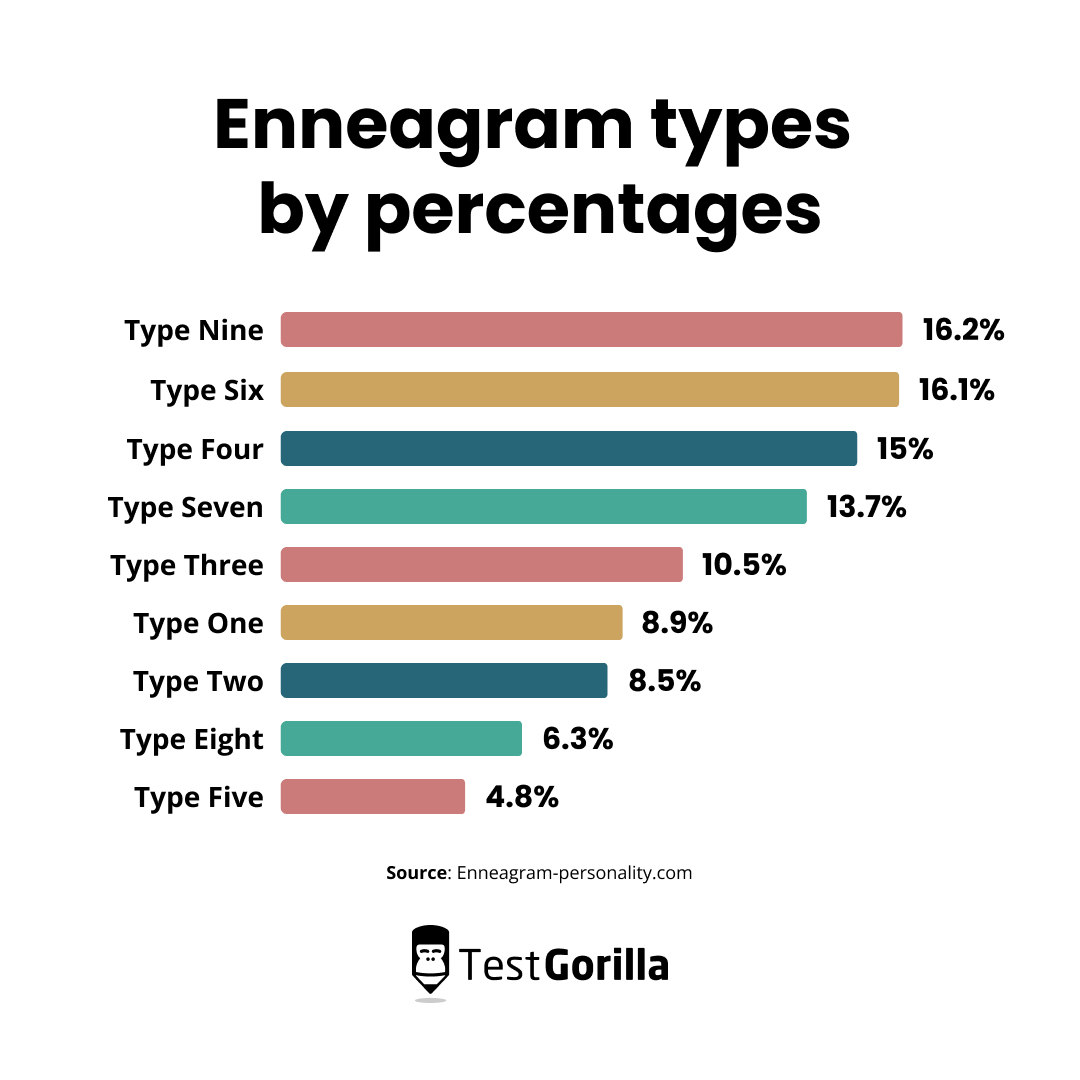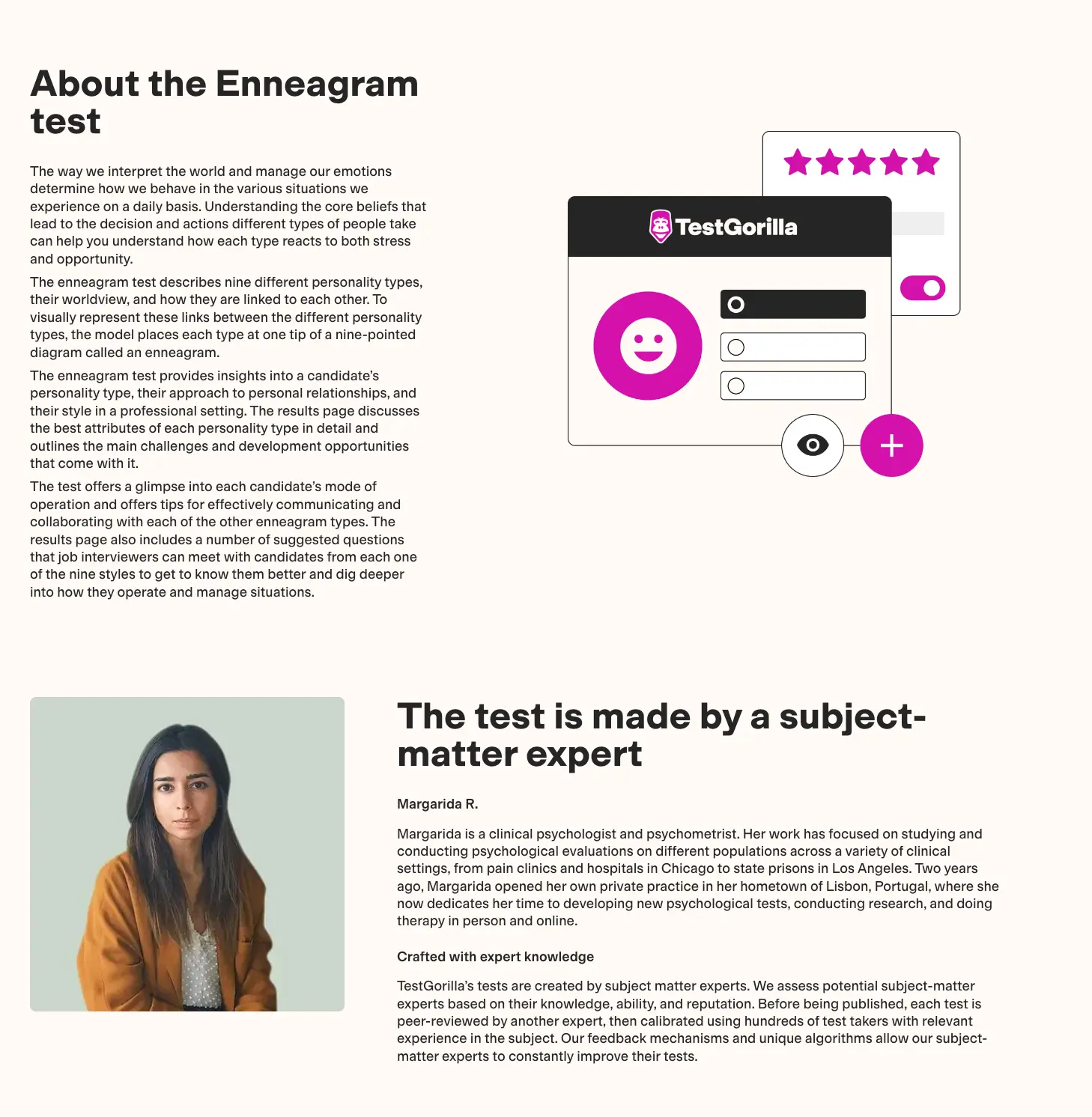What is the rarest Enneagram type & why?
Get to know your candidates better with TestGorilla's Enneagram test
Conducting an Enneagram test can help you understand your applicants’ and current employees' personality traits and behavioral tendencies more deeply. Integrating these tests into your hiring process can make identifying which candidates will work well with your existing team’s dynamic easier.
The Enneagram test categorizes individuals into nine types - but one type is rarer than the rest.
In this article, we explore the rarest Enneagram type, how individuals with this personality type contribute to the workplace, their areas for growth, and more. We also explain why incorporating Enneagram tests into your hiring process can help you make better hires.
Table of contents
Which is the rarest Enneagram type?
The rarest Enneagram type is Type Five, also known as the Pioneer or the Investigator.
Type Fives are innovative individuals known for their motivation to learn more about the world, obtain new skills, and become experts in their field so they can be self-sufficient. They value their solitude and tend to be reclusive.
The prevalence of Enneagram types is generally measured using what’s called an Enneagram type distribution survey. In these surveys, participants simply note their Enneagram personality type – Type One, Two, Three, Four, Five, Six, Seven, Eight, or Nine.
In a 2022 survey of over 54,000 participants, approximately 10%, or 5,400, identified as Enneagram Type Fives. The survey found that 14% of men who participated were Type Fives, compared to 7% of women.
In another Enneagram type distribution survey of 189,957 participants, researchers found that only 4.8% of participants were Type Fives. In this survey, 7% of Type Fives were men, while 3% were women.
According to this survey’s results, the Enneagram types ranked from most to least common are:
Type Nine (16.2% of participants)
Type Six (16.1%)
Type Four (15%)
Type Seven (13.7%)
Type Three (10.5%)
Type One (8.9%)
Type Two (8.5%)
Type Eight (6.3%)
Type Five (4.8%)
Recommended reading: The most common Enneagram type (Most to least popular)
Limits to the Enneagram type distribution survey
Enneagram types account for an individual's basic fears, motivators, and desires. As a result, there’s a huge limitation to using an Enneagram type distribution survey to measure the rarity of each type: individuals’ willingness to participate.
Personality types who dislike being in the spotlight or speaking about themselves may be more likely to shy away from taking Enneagram surveys. Conversely, personality types who value individuality and self-reflection may be more inclined to participate in this survey.
This can skew survey results, making them less representative of the population. The survey may show a higher percentage of some Enneagram types simply because more of these individuals participated in the exercise.
Additionally, the rarity of a particular personality type may differ across populations, industries, and cultures.
Understanding the rarest Enneagram type: Type 5
Introverted critical thinkers, Type Fives are endlessly curious, striving to pursue as much knowledge as possible to be self-sufficient.
Your employees who often learn new skills, regularly pick up new skills-based hobbies like coding or carpentry, or show signs that they’re introverted and stoic are likely Enneagram Type Fives. They’re usually introverted because they focus on constant skill development, as self-reliance gives them a sense of autonomy and freedom.
Basic strengths
These individuals constantly seek and gather information to learn new skills or develop existing ones. Fives use their strong analytical abilities to create new ideas and identify patterns that often lead to innovations.
Basic fears
Pioneers fear being seen as incompetent or useless. They avoid this by remaining self-sufficient and creating a sense of security with the knowledge they’ve gained.
Basic desires
Type Fives’ biggest desire is to be knowledgeable. One of the reasons they continuously try to upskill themselves is their desire to master new skills as the world advances. This desire drives them to excel at their jobs.
Why are Type Fives the rarest Enneagram type?
It’s difficult to say for certain, but the consensus is that Type Fives’ reclusive nature makes them more difficult to identify in a population. They become heavily focused on what matters most to them and often withdraw from the outer world.
This introvertedness makes Fives less likely to participate in Enneagram type distribution surveys. As a result, they appear to be the rarest Enneagram type.
Enneagram Type 5 in the workplace
In the workplace, Type Fives are problem-solving innovators who pay keen attention to details. They work well independently and thrive in roles requiring expert knowledge and specialized skills.
Their desire for autonomy and freedom makes them resistant to following strict workplace rules and policies. Fives sometimes struggle to communicate with colleagues since they prefer to work alone. Similarly, their reluctance to socialize can result in them not sharing valuable opinions.
Type 5s’ basic strengths in the workplace
Analytical thinking
Ability to solve complex problems
Can come up with innovative solutions
Type 5s’ basic fears in the workplace
Being incompetent at their jobs
Making mistakes and failing
Type 5s’ basic desires in the workplace
Independent work or being their own boss
Freedom to work in a way that best suits them
To be fully competent in their role
Growth areas for Type 5s
1. Interpersonal relationships
Type Fives’ introversion may cause them to struggle with interpersonal connections. Since they typically prefer solitude and intellectual growth instead of social interactions, they tend to be more detached than other Enneagram types. This can lead to isolation and a lack of engagement at work.
You can help your Type Five employees foster relationships with coworkers by implementing social events like company outings and team-building exercises.
2. Communication skills
Similarly, Type Five personalities sometimes fall short in communication due to their introverted nature. They thrive when you allow them to “do their own thing,” but it’s important to encourage them to communicate more with their colleagues. This is crucial for ensuring your team members work well together.
Start by encouraging your employees with Type Five personalities to speak up during meetings and brainstorming sessions to get them more comfortable communicating openly. You might offer them training or resources on effective communication to strengthen their skills in this area. Since Type Fives highly value personal development, they’ll likely appreciate this opportunity.
3. Collaboration skills
Enneagram Type Fives also have room to improve their collaboration skills, particularly if they work in a team-oriented environment.
Type Fives are fiercely independent and may try to do entire projects on their own, which can lead to burnout, delays, and other issues. Encourage them to accept help when they need it so your team can successfully work toward shared goals.
Why use Enneagram tests in hiring campaigns?
Using Enneagram tests in your hiring campaigns can be a game-changer. By identifying candidates' Enneagram types, you can better understand their motivations, strengths, and potential challenges. This makes it easy to identify candidates who will fit well into your existing team and overall company culture.
TestGorilla’s 10-minute Enneagram Personality test is a quick, reliable way to discover your candidates’ Enneagram types. The test features 45 questions that ask test-takers to choose between statements, selecting the ones they agree with most.
You’ll receive a detailed report for each candidate so you can easily interpret the Enneagram test results. Reports include tips on communicating with each type, notes on how they’re likely to interact with one another, and a rundown of their basic strengths and weaknesses.
We recommend using Enneagram tests to complement skills-based pre-employment tests. This way, you can get a comprehensive view of your applicants and make well-informed hiring decisions.
Explore our test library without making a financial commitment
Sign up for a free forever plan with TestGorilla, build your own assessments, and explore our expanding test library without making a financial commitment.
Incorporate TestGorilla's personality tests to your hiring campaigns
Various surveys report Type Five as the rarest Enneagram type. This may be due to their introverted traits, potentially making them less likely to participate in Enneagram type distribution surveys.
Type Fives are intellectual, analytical individuals who excel in highly technical or creative fields. They have a strong desire to gain knowledge and master new skills but tend to have trouble communicating and collaborating with others.
By incorporating TestGorilla’s Enneagram Personality test into your hiring campaigns, you can identify individuals who possess the required skills for the role and fit seamlessly into your company's culture.
Sign up for a free trial of TestGorilla and start using the Enneagram Personality test today.
Related posts
Hire the best candidates with TestGorilla
Create pre-employment assessments in minutes to screen candidates, save time, and hire the best talent.
Latest posts
The best advice in pre-employment testing, in your inbox.
No spam. Unsubscribe at any time.

Hire the best. No bias. No stress.
Our screening tests identify the best candidates and make your hiring decisions faster, easier, and bias-free.
Free resources
This checklist covers key features you should look for when choosing a skills testing platform
This resource will help you develop an onboarding checklist for new hires.
How to assess your candidates' attention to detail.
Learn how to get human resources certified through HRCI or SHRM.
Learn how you can improve the level of talent at your company.
Learn how CapitalT reduced hiring bias with online skills assessments.
Learn how to make the resume process more efficient and more effective.
Improve your hiring strategy with these 7 critical recruitment metrics.
Learn how Sukhi decreased time spent reviewing resumes by 83%!
Hire more efficiently with these hacks that 99% of recruiters aren't using.
Make a business case for diversity and inclusion initiatives with this data.






















